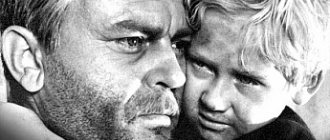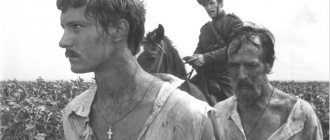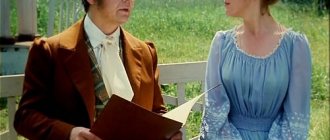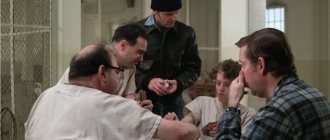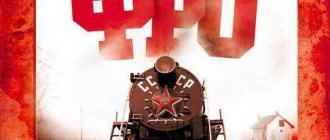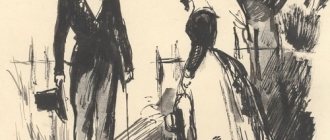The main characters of the story “The Fate of Man”:
When reading the short story “The Fate of Man”, it is important to get acquainted with its main characters. The characterization of the hero will help you understand the storyline of the work.
- Andrei Sokolov is the same soldier whose fate is discussed in the story. During the war, he worked as a driver and was one of those soldiers who did not fight for rank. Andrei Sokolov will be in captivity for two long years, will lose loved ones, but will not harden his heart.
- Anatoly is the son of Andrei Sokolov, who fought honestly and valiantly, like his father. Anatoly will fall from a sniper's bullet on Great Victory Day.
- Vanyushka is the adopted son of Andrei Sokolov.
About the product
Mikhail Sholokhov's story “The Fate of a Man” tells the story of the life of the Great Patriotic War soldier Andrei Sokolov. The coming war took everything from the man: family, home, faith in a bright future. His strong-willed character and fortitude did not allow Andrey to break. A meeting with the orphaned boy Vanyushka brought new meaning to Sokolov’s life.
This story is included in the 9th grade literature curriculum. Before you get acquainted with the full version of the work, you can read online a summary of “The Fate of a Man” by Sholokhov, which will introduce you to the most important episodes of “The Fate of a Man.”
The material was prepared jointly with a teacher of the highest category, Kuchmina Nadezhda Vladimirovna.
Experience as a teacher of Russian language and literature - 27 years.
Minor characters in the story “The Fate of Man”:
The story contains a number of minor characters who remain, as it were, “behind the scenes” for the reader. They are episodic in the life of Andrei Sokolov.
- His wife Irina, daughters Nastenka and Olyushka are the deceased family of Andrei Sokolov, who live only in the memories of the protagonist.
- Kryzhnev is a traitor.
- Müller - Lagerfuhrer.
- The author is a minor but audible hero of the story, who met Sokolov and his Vanyusha at the crossing.
Cast
When starting to search for actors for the main roles, Bondarchuk did not know who would play the boy. With the rest of the actors, everything was clear at the planning stage: in addition to the main role of Andrei Sokolov, which was to be played by the director himself, other roles in the film went to Zinaida Kiriyenko (wife Irina), Yuri Averin (Lagerführer Müller), Pavel Volkov, Lev Borisov, etc. But nothing worked out with the role of Vanechka. Bondarchuk looked at more than a thousand children, he traveled to pioneer camps, labor groups, attended various patriotic events, visited schools, but could not find the one he needed. Chance helped - a children's film was shown at the House of Cinema, Bondarchuk came there quite by accident and saw five-year-old Pasha Polunin. After talking with the child's father, the director received consent - and finally filming could begin.
Sergei Bondarchuk as Andrei Sokolov in his feature film “The Fate of a Man” (1959)
Pasha Boriskin as Vanyushka and Sergei Bondarchuk as Andrei Sokolov in Sergei Bondarchuk’s feature film “The Fate of a Man” (1959)
Zinaida Kiriyenko as Irina in Sergei Bondarchuk’s feature film “The Fate of a Man” (1959)
War and captivity
Andrei was accompanied to the front by his children and wife. Irina had it the worst of all; she decided that she was seeing her husband for the last time. The hero waited for a long time for his wife to calm down, but she did not let up. Then he lightly pushed her away from him, offended that she was burying him ahead of time, which he regretted terribly afterwards. After all, a new meeting with his family never happened.
During the war, Sokolov served by profession as a driver. Was wounded twice. In May 1942 he was captured. One night, when a convoy with prisoners spent the night in the church, Sokolov killed the traitor Kryzhnev, who wanted to hand over to the Germans a platoon commander unfamiliar to the hero for his communist views. While he and other prisoners were being driven away, he tried to escape. The Nazis set dogs on the fugitive's trail and returned him to the camp.
Summary
The first spring after the war has arrived on the Upper Don. The hot sun touched the ice on the river and a flood began, turning the roads into a washed-out, impassable slurry.
The author of the story at this time of impassability needed to get to the Bukanovskaya station, which was about 60 km away. He reached the crossing of the Elanka River and, together with the driver accompanying him, swam on a boat full of holes from old age to the other side. The driver sailed away again, and the narrator remained waiting for him. Since the driver promised to return only after 2 hours, the narrator decided to take a smoke break. He took out the cigarettes that had gotten wet during the crossing and laid them out to dry in the sun. The narrator sat down on the fence and became thoughtful.
Soon he was distracted from his thoughts by a man and a boy who were moving towards the crossing. The man approached the narrator, greeted him and asked how long the wait for the boat would be. We decided to have a smoke together. The narrator wanted to ask his interlocutor where he was going with his little son in such off-road conditions. But the man got ahead of him and started talking about the past war. This is how the narrator became acquainted with the life story of Andrei Sokolov.
Life before the war
Andrei had a hard time even before the war. As a young boy, he went to the Kuban to work for the kulaks (wealthy peasants). It was a harsh period for the country: it was 1922, a time of famine. So Andrei’s mother, father and sister died of hunger. He was left completely alone. He returned to his homeland only a year later, sold his parents' house and married the orphan Irina. Andrey got a good wife, obedient and not grumpy. Irina loved and respected her husband.
Soon the young couple had children: first a son, Anatoly, and then daughters Olyushka and Nastenka. The family settled down well: they lived in abundance, they rebuilt their house. If earlier Sokolov would drink with friends after work, now he was in a hurry home to his beloved wife and children. In 1929, Andrei left the factory and began working as a driver. Another 10 years flew by unnoticed for Andrey.
The war came unexpectedly. Andrei Sokolov received a summons from the military registration and enlistment office, and he is leaving for the front.
War time
The whole family accompanied Sokolov to the front. A bad feeling tormented Irina: as if it was the last time she would see her husband.
During the distribution, Andrei received a military truck and went to the front in it. But he didn’t have to fight for long. During the German offensive, Sokolov was given the task of delivering ammunition to soldiers in a hot spot. But it was not possible to bring the shells to their own: the Nazis blew up the truck.
When Andrei, who miraculously survived, woke up, he saw an overturned truck and exploded ammunition. And the battle was already going on somewhere behind. Then Andrei realized that he was directly surrounded by the Germans. The Nazis immediately noticed the Russian soldier, but did not kill him: they needed labor. This is how Sokolov ended up in captivity along with his fellow soldiers.
The prisoners were driven into a local church to spend the night. Among those arrested was a military doctor who made his way in the dark and questioned each soldier about the presence of wounds. Sokolov was very worried about his arm, which was dislocated during the explosion when he was thrown out of the truck. The doctor set Andrei's limb, for which the soldier was very grateful to him.
The night turned out to be restless. Soon one of the prisoners began to ask the Germans to let him out to relieve himself. But the senior guard forbade anyone to leave the church. The prisoner could not stand it and cried: “I can’t,” he says, “desecrate the holy temple! I’m a believer, I’m a Christian!” The Germans shot the annoying pilgrim and several other prisoners.
After this, the arrested became quiet for a while. Then conversations began in whispers: they began to ask each other where they were from and how they were captured.
Sokolov heard a quiet conversation next to him: one of the soldiers threatened the platoon commander that he would tell the Germans that he was not an ordinary private, but a communist. The threat, as it turned out, was called Kryzhnev. The platoon commander begged Kryzhnev not to hand him over to the Germans, but he stood his ground, arguing “that his own shirt is closer to his body.”
After hearing what Andrei heard, he began to shake with rage. He decided to help the platoon commander and kill the vile party member. For the first time in his life, Sokolov killed a person, and he felt so disgusted, as if he was “strangling some creeping thing.”
Camp work
In the morning, the fascists began to find out which of the prisoners were communists, commissars and Jews in order to shoot them on the spot. But there were no such people, as well as traitors who could betray them.
When the arrested were driven to the camp, Sokolov began to think about how he could break out to his own people. Once such an opportunity presented itself to the prisoner, he managed to escape and break away from the camp by 40 km. Only the dogs followed Andrei's tracks, and he was soon caught. The poisoned dogs tore all his clothes and bit him until he bled. Sokolov was placed in a punishment cell for a month. After the punishment cell followed 2 years of hard work, hunger, and abuse.
Sokolov ended up working in a stone quarry, where the prisoners “manually chiseled, cut, and crushed German stone.” More than half of the workers died from hard work. Andrei somehow could not stand it and said towards the cruel Germans: “They need four cubic meters of production, but for the grave of each of us, one cubic meter through the eyes is enough.”
A traitor was found among his own and reported this to the Fritz. The next day, Sokolov was asked by the German authorities. Before leading the soldier to be shot, the block commandant Müller offered him a drink and snack for the German victory.
Almost looking death in the eye, the brave fighter refused such an offer. Muller just smiled and ordered Andrei to drink to his death. The prisoner had nothing left to lose, and he drank to escape his torment. Despite the fact that the fighter was very hungry, he never touched the Nazis’ snack. The Germans poured a second glass for the arrested man and again offered him a snack, to which Andrei replied to the German: “Sorry, Herr Commandant, I’m not used to having a snack even after the second glass.” The Nazis laughed, poured Sokolov a third glass and decided not to kill him, because he showed himself to be a real soldier loyal to his homeland. He was released to the camp, and for his courage he was given a loaf of bread and a piece of lard. The block divided this food equally among all the prisoners.
The escape
Soon Andrei ends up working in the mines in the Ruhr region. It was 1944, Germany began to lose ground.
By chance, the Germans find out that Sokolov is a former driver, and he enters the service of the German Todte office. There he becomes the personal driver of a fat Fritz, an army major. After some time, the German major is sent to the front line, and Andrei with him.
Once again the prisoner began to have thoughts of escaping to his own people. One day Sokolov noticed a drunken non-commissioned officer, took him around the corner, and stripped him of all his uniform. Andrey hid the uniform under the seat in the car, and also hid a weight and a telephone wire. Everything was ready to carry out the plan.
One morning the major ordered Andrey to take him out of town, where he was in charge of the construction. On the road, the German dozed off, and as soon as we left the city, Sokolov took out a weight and stunned the German. Afterwards, the hero took out his hidden uniform, quickly changed clothes and rode at full speed towards the front.
This time the brave soldier managed to reach his own people with a German “gift”. They greeted him as a real hero and promised to present him with a state award. They gave the fighter a month off to get medical treatment, rest, and see his family.
Sokolov was first sent to the hospital, from where he immediately wrote a letter to his wife. 2 weeks have passed. An answer comes from home, but not from Irina. The letter was written by their neighbor, Ivan Timofeevich. This message turned out to be sad: Andrei’s wife and daughters died back in 1942. The Germans blew up the house where they lived. All that was left of their hut was a deep hole. Only the eldest son, Anatoly, survived, who after the death of his relatives asked to go to the front.
Andrei came to Voronezh, looked at the place where his house used to stand, and now a pit filled with rusty water, and on the same day he went back to the division.
Waiting to meet my son
For a long time Sokolov did not believe his misfortune and grieved. Andrei lived only with the hope of meeting his son. A correspondence began between them, and the father learns that Anatoly became the division commander and received many awards. Andrei was filled with pride for his son, and in his thoughts he already began to draw pictures of how he and his son would live after the war, how he would become a grandfather and nurse his grandchildren, and meet a calm old age.
At this time, Russian troops were rapidly advancing and pushing the Nazis back to the German border. Now it was no longer possible to correspond, and only towards the end of spring did my father receive news from Anatoly. The soldiers came close to the German border, and on May 9 the war ended.
Excited, happy Andrei was looking forward to meeting his son. But his joy was short-lived: Sokolov was informed that the battery commander was shot by a German sniper on May 9, 1945, Victory Day. Anatoly's father saw him off on his last journey, burying his son on German soil.
Post-war time
Soon Sokolov was demobilized, but he did not want to return to Voronezh because of difficult memories. Then he remembered a military friend from Uryupinsk, who invited him to his place. That's where he headed.
A friend lived with his wife on the outskirts of the city; they had no children. A friend of Andrei’s got him a job as a driver. After work, Sokolov often went to the teahouse to have a glass or two. Near the teahouse, Sokolov noticed a homeless boy about 5-6 years old. Andrei learned that the homeless child's name was Vanyushka. The child was left without parents: his mother died during a bombing, and his father was killed at the front. Andrey decided to adopt a child.
Sokolov brought Vanya to the house where he lived with a married couple. The boy was washed, fed and dressed. The child began to accompany his father on every flight and never agreed to stay at home without him.
So the little son and his father would have lived for a long time in Uryupinsk, if not for one incident. Once Andrei was driving a truck in bad weather, the car skidded and he knocked over a cow. The animal remained unharmed, but Sokolov was deprived of his driver's license. Then the man signed up with another colleague from Kashara. He invited him to work with him and promised that he would help him get new licenses. So they are now on their way with their son to the Kashar region. Andrei admitted to the narrator that he still couldn’t stand it in Uryupinsk for long: the melancholy does not allow him to sit in one place.
Everything would be fine, but Andrei’s heart began to play tricks, he was afraid: he couldn’t stand it, and his little son would be left alone. Every day, the man began to see his deceased relatives as if they were calling him to them: “I talk about everything with Irina and with the kids, but as soon as I want to push the wire with my hands, they leave me as if they are melting before my eyes... And here’s an amazing thing: During the day I always hold myself tightly, you can’t squeeze a single “ooh” or a sigh out of me, but at night I wake up and the whole pillow is wet with tears...”
Then a boat appeared. This is where the story of Andrei Sokolov ended. He said goodbye to the author, and they moved towards the boat. With sadness, the narrator looked after these two close, orphaned people. He wanted to believe in the best, in the better future fate of these strangers who had become close to him in a couple of hours.
Vanyushka turned and waved goodbye to the narrator.
Release from captivity
After two years in captivity, Sokolov was assigned to drive a fascist major, who treated him tolerably and even threw him food. At the first opportunity, having stunned his boss, the hero fled to the front line and returned to his own.
While being treated in the hospital, Sokolov wrote a letter home. A neighbor sent him an answer, it said that Andrei no longer had a home, a wife, or daughters - only a shell crater where his family’s hearth had once been. Fortunately, Anatoly’s son was not there at the time of the bombing. He graduated from artillery school and went to the front.
War is over
On the day of the Great Victory, a sniper killed Anatoly and Sokolov returned to his homeland alone. Saddened by the death of his son, the hero did not want to return to his hometown and went to his friend. There he got a job as a driver and met an orphan boy, Vanya. Taking pity on the homeless boy, Sokolov adopted him, and they lived together as one family. Taking care of little Vanyusha helped Sokolov survive the loss of his family.
